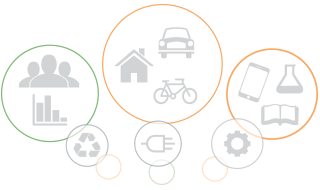OGP is a process – not a moment in time
Civil Society Support for Ireland’s OGP membership grows
The international Open Government Partnership was established in 2011 and the prospect of Ireland joining OGP gathered pace throughout 2012. The initiative was actively promoted in that year by Active Citizen Ireland which corresponded with TDs and government representatives. During a Seanad debate on the Ombudsman (Amendment) Bill in September 2012, the Minister for Public Expenditure and Reform, Brendan Howlin, stated his Department’s intention to explore the potential for Ireland’s participation in the OGP. OGP participation was subsequently recommended by Transparency International’s Country Study Addendum on Ireland’s National Integrity Systems, published in October 2012. In December 2012, the Minister for Public Expenditure and Reform, Brendan Howlin, announced Ireland’s intention to explore and implement Open Government in his Budget Day speech. For more detail on the campaign for Ireland to join OGP, read this OGP blog:The Irish Experience Phase 1: The Campaign to Join
Committing to OGP
Ireland Commits to Joining OGP
In May 2013 Ireland committed formally to joining the Open Government Partnership. Here is the letter from the Minister, in PDF format: Ireland Letter of OGP Intent (PDF) . Since then, officials from Minister Howlin’s department held several meetings with an ad hoc group of civil society representatives who have been keen to see the process evolve. These included Active Citizen, TASC, Dóchas, The Wheel, Transparency International Ireland, Open Knowledge Foundation Ireland as well as individuals. An Open Government Ireland (Google Group) provided a space for civil society and citizens to nurture dialogue and keep the issue visible.
Kick-off Consultation with Citizens and Civil Society
Between July and September 2013, citizens and civil society were asked what they wanted to see included in Ireland’s first OGP Action Plan, and how OGP could deliver on its potential in the longer term. This consultation was coordinated by Transparency International Ireland, which was appointed by the Department of Public Expenditure and Reform following a tender process. Three public meetings were held, attended by more than 100 participants. There were also opportunities for online engagement through this website, which was established as part of that consultation.
‘Good Ideas Come From Everywhere’
The consultation gave civil society and citizens an opportunity to say what they thought belonging to the Open Government Partnership should mean in Ireland. At three public meetings and through collaborative input online, more than 100 participants came up with a total of 62 concrete commitments for inclusion in Ireland’s first OGP National Action Plan. A report detailing these proposals has been sent to the Department of Public Expenditure and Reform, which is sponsoring this consultation. Read the report.
Individuals and civil society organisations took part in public consultations on OGP between July and September 2013. Here is a timeline and outline of these consultations:
What happened at these three meetings?
|
Meeting I – July 10 Wood Quay Venue Dublin - Agenda
Read summary See photos Watch video
Meeting II – August 8 Wood Quay Venue Dublin – Agenda
Read summary See photos Watch video
Meeting III – September 5 Wood Quay Venue Dublin - Agenda
Read summary See photos |
What happened between these three meetings?
Work and discussion continued between the three planned meetings. Transparency International Ireland digested and summarised notes from the meetings and developed draft working documents based on open government challenges and the proposed solutions. These working documents were made available online for input/feedback/comment during the consultation process. More information about working groups set up as part of this consultation. All working documents were circulated and made available on this website for collaborative input. These were refined and finalised as part of an iterative process that was open and inclusive.
Here’s the simple framework used for the discussions about the OGP in Ireland
- What promises do you want the government to make in its first OGP National Action Plan?
- Which are the most important?
- Why are these the most important?
- How do you think stakeholder participation in the OGP consultation process could be enhanced in the future?
- What are your views for the future development and deepening of Ireland’s OGP participation, particularly in making it easy for citizens and civil society interests to take part?
The Mantra was: Meet – Discuss – Recommend
What happened next?
After the conversations, a report was put together and presented to the Department of Public Expenditure and Reform. It contains the 62 proposed Action Plan commitments prepared by citizens and civil society, along with their views for future stakeholder participation in Ireland’s OGP consultation process.
After that there will be an ongoing role for citizens and civil society as their recommendations are considered together with the government’s own proposals in finalising an Action Plan which will secure Ireland’s full participation in the OGP by April 2014.
The input gathered through this initial consultation exercise will help shape Ireland’s OGP process in the months and years ahead – both for the country’s first Action Plan commitments and for future, deeper, stakeholder engagement.
The Open Government Partnership is not about a moment in time – it is a process that will evolve and be refined as Action Plan commitments are delivered and new undertakings made.
How has it worked elsewhere?
Sometimes the process of developing OGP country plans has been rushed, and sometimes not all the appropriate actors were involved. However, a structure and deadline give focus. This initial phase of the Irish consultation took place over three months. It is up to people and organisations to get involved, and up to all of us to spread the word that the conversation is ongoing.
See here for notes on how they did it in Croatia. And here for the UK
Here is some analysis from the experiences of eight countries – Brazil, Croatia, Indonesia, Moldova, Montenegro, Peru, Ukraine and the UK, together with the lessons that have emerged from their experience of establishing OGPs.
Citizens and Civil Society Present Action Plan Proposals
A total of 62 Action Plan proposals were generated by these consultations, which were organised the OGP’s 4 core principles of Accountability, Citizen Participation, Technology and Innovation and Transparency.The Final Report on of these consultations was sent to the Department of Public Expenditure and Reform in October 2013. You can download it here in PDF: Report of a Consultation with Civil Society Representatives and Citizens on Ireland’s Participation in the Open Government Partnership In addition to this report, a total of ten other submissions were made to the Department of Public Expenditure and Reform from a variety of organisations and individuals.
For more detail on the consultation with citizens and civil society read this OGP blog: The Irish Experience Phase 2: From Intention to Consultation.
Collaboration Towards Ireland’s First OGP National Action Plan (NAP)
A Joint Working Group made up of civil society members/citizens and government officials was set up in February 2014 to work on Ireland’s first OGP NAP. Between February and April 2014 this group held weekly meetings to discuss proposals and priorities for a draft National Action Plan. During this period, the civil society volunteers on the Joint Working Group reported back to a wider civil society group at weekly meetings of the OGP Civil Society Forum. At these sessions, participants have examined and discussed the NAP proposals and worked collaboratively on draft documents. The Forum is open to all, individuals and groups alike. You can join our mailing list for updates. For more information, see the working documents and notes of these meetings.
For a view from the Department of Public Expenditure and Reform on Ireland’s OGP journey to date, read this blog by the head of the Department’s Government Reform Unit which is leading Ireland’s OGP membership: Ireland’s OGP Journey
For a perspective on the consultations from a member of the Open Knowledge Foundation Ireland, read this blog: A Fresh Look at OGP from Ireland
Ireland’s First Draft National Action Plan Published
Mr. Brendan Howlin, Minister for Public Expenditure and Reform published Ireland’s first Open Government Partnership Draft OGP National Action Plan for public comment on May 8th, 2014 at the Europe Regional Meeting, in advance of submission to Government for approval in June 2014. The 26 commitments in the Ireland’s draft National Action Plan focus on:
- Promoting Open Data and Transparency
- Building Citizen Participation and
- Rebuilding public trust in Government
What Now?
Next Steps
When Ireland formally presents its first National Action Plan in June 2014, it endorses the OGP Declaration of Principles and reiterate its commitment to the principles enshrined in the Universal Declaration of Human Rights, the UN Convention against Corruption, and other instruments related to human rights and good governance.
The Action Plan is to then be agreed by existing members of the OGP.
The next step is that Ireland must act on its commitments it laid out in its Action Plan.
An Implementation and Review Group (IRG) composed of representatives of civil society and Government Departments will oversee progress in respect of the plan as a whole. This group would be expected to meet at least every three months and publish a progress report on a six monthly basis.
After 12 months of OGP implementation, Ireland is required to publish a progress report and be reviewed by the Independent Reporting Mechanism (IRM). The IRM is overseen by a panel of international experts. At this stage the second National Action Plan will be in full swing.
For more information on the IRM, see this “myth busting” presentation by the team that oversees the independent progress report, made at the European Regional Meeting in Dublin in May 2014: Busting some of the myths around OGP
The ultimate aim of the OGP is that it facilitates for an ongoing programme that gives citizens access and involvement in decisions made by government. For more information, go to the OGP section on the website of the Department of Public Expenditure and Reform or the international OGP website.




